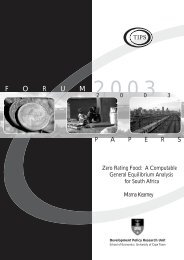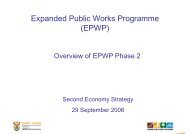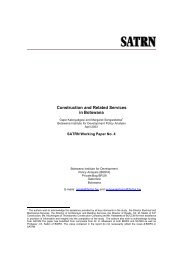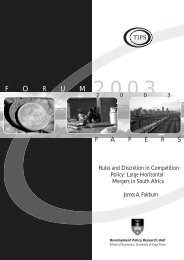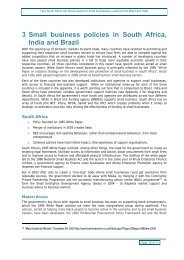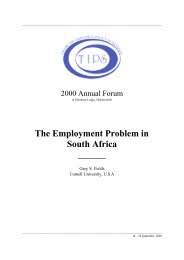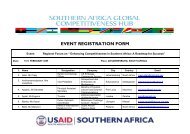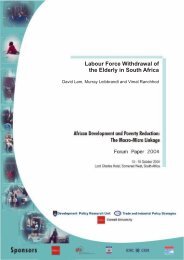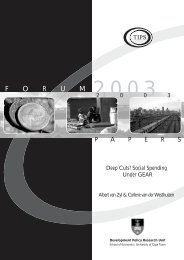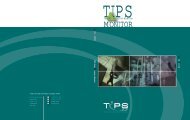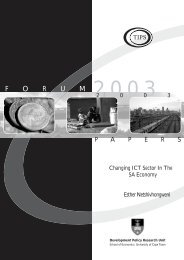(AsgiSA) Annual Report 2008 - South African Government Information
(AsgiSA) Annual Report 2008 - South African Government Information
(AsgiSA) Annual Report 2008 - South African Government Information
Create successful ePaper yourself
Turn your PDF publications into a flip-book with our unique Google optimized e-Paper software.
Accelerated and Shared Growth Initiative for <strong>South</strong> Africa<br />
ANNUAL REPORT<br />
<strong>2008</strong><br />
The Monyetla Project has seen many successes as evident in the figures below:<br />
• 963 learners started in the first roll-out<br />
• 85 are still completing the process<br />
• 878 have completed the training<br />
• 753 of the 878 have been successful and have completed the training (85,8%)<br />
• 679 of the 753 successful learners have been employed (90,2%)<br />
• 679 of the total of the 878 learners who began the training, have been successful and are<br />
employed (77,3%)<br />
• 202 supervisors have been trained (against a required 146, so this target has been exceeded<br />
by 38%).<br />
Jipsa will continue to provide a watching brief and report on progress through regular updates<br />
from the dti.<br />
4.9 Agriculture<br />
Jipsa has given agriculture the highest level of priority. A concept document, commissioned<br />
by Jipsa and tested with key stakeholders, highlighted the fact that the agricultural sector<br />
has not performed as well as it should and yet it has great potential to contribute towards<br />
halving poverty, reducing unemployment and improving the lives of rural communities. It is<br />
thus important to review existing policies and ensure that new policies are put in place that<br />
will put the sector on a higher growth trajectory.<br />
While agriculture is Jipsa’s newest area of work, significant progress was made in <strong>2008</strong> in<br />
analysing the skills constraints in the agricultural sector. The concept paper highlighted eight<br />
areas for intervention:<br />
• improving the effectiveness and efficiency of government agricultural extension services<br />
• improving the access of emerging farmers to professional mentoring services<br />
• rolling out adult basic education and training and HIV and AIDS awareness programmes to<br />
farm workers<br />
• transforming agricultural colleges into centres of excellence<br />
• increasing the supply of high-level technical skills to the sector<br />
• developing linkages between FET colleges and the broader agricultural sector<br />
• improving the AgriSeta funding model<br />
• promoting the agricultural sector as a career opportunity to the youth.<br />
The various intervention opportunities were interrogated and refined through a stakeholder<br />
consultation process convened by the Jipsa Secretariat. This process revealed that some of<br />
36



